Search the Special Collections and Archives Portal
Search Results
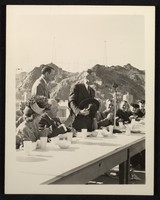
Photograph of the Rotary Club, Hoover Dam, circa October 1946
Date
Archival Collection
Description
An image of Rotary Club members having lunch at Boulder Dam. Note: Boulder Dam was officially renamed Hoover Dam in 1947.
Image
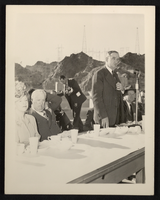
Photograph of the Rotary Club, Hoover Dam, circa October 1946
Date
Archival Collection
Description
An image of Rotary Club members having lunch at Boulder Dam while an unidentified man gives a speech. Note: Boulder Dam was officially renamed Hoover Dam in 1947.
Image
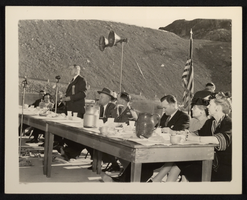
Photograph of the Rotary Club, Hoover Dam, circa October 1946
Date
Archival Collection
Description
An image of Rotary Club members having lunch at Boulder Dam while an unidentified man gives a speech. Note: Boulder Dam was officially renamed Hoover Dam in 1947.
Image
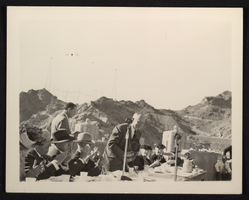
Photograph of the Rotary Club, Hoover Dam, October 1946
Date
Archival Collection
Description
An image of Rotary Club members having lunch at Boulder Dam while an unidentified man gives a speech. Note: Boulder Dam was officially renamed Hoover Dam in 1947.
Image
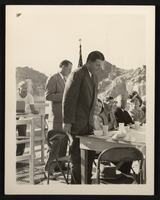
Photograph of the Rotary Club, Hoover Dam, circa October 1946
Date
Archival Collection
Description
An image of Rotary Club members having lunch at Boulder Dam while an unidentified man stands up to give a speech. Note: Boulder Dam was officially renamed Hoover Dam in 1947.
Image
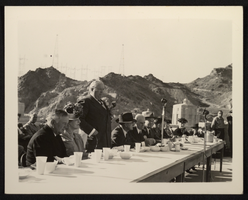
Photograph of the Rotary Club, Hoover Dam, October 1946
Date
Archival Collection
Description
An image of Rotary Club members having lunch at Boulder Dam. Earl Brothers is also present in this photograph. Note: Boulder Dam was officially renamed Hoover Dam in 1947.
Image
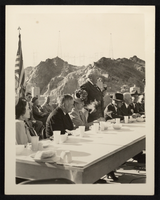
Photograph of the Rotary Club, Hoover Dam, circa October 1946
Date
Archival Collection
Description
An image of Rotary Club members having lunch at Boulder Dam while an unidentified man stands up to give a speech. Note: Boulder Dam was officially renamed Hoover Dam in 1947.
Image
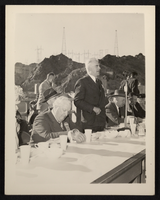
Photograph of the Rotary Club, Hoover Dam, October 1946
Date
Archival Collection
Description
An image of Rotary Club members having lunch at Boulder Dam while an unidentified man stands up to give a speech. Note: Boulder Dam was officially renamed Hoover Dam in 1947.
Image

Photograph of the Rotary Club, Hoover Dam, circa October 1946
Date
Archival Collection
Description
An image of Rotary Club members having lunch at Boulder Dam while an unidentified man stands up to give a speech. Note: Boulder Dam was officially renamed Hoover Dam in 1947.
Image

Photograph of the Rotary Club, Hoover Dam, circa October 1946
Date
Archival Collection
Description
An image of Rotary Club members having lunch at Boulder Dam while Governor Vail Pittman gives a speech. Note: Boulder Dam was officially renamed Hoover Dam in 1947.
Image
